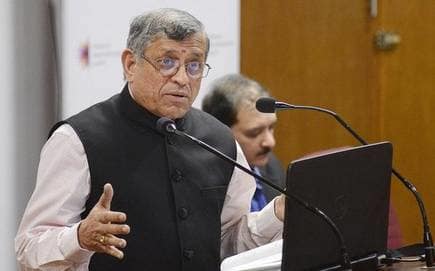S Gurumurthy, the non-official part-time director of Reserve Bank of India has sent a legal notice to the ‘liberal’ mouthpiece, ‘The Economist’ for publishing defamatory content. The international magazine published an article in print and web edition on November 24th, 2018 about Gurumurthy with the title “The person who is doing most to undermine the Reserve Bank of India”. The article claimed that “Other than Narendra Modi, the prime minister, he is perhaps the man India’s liberal economists most fear.”
I have sent legal notice to The Economist for defamation @TheEconomist
Here is the text of the legal noticehttps://t.co/FoEx5C6iBk— S Gurumurthy (@sgurumurthy) January 11, 2019
Gurumurthy has not been supportive towards the previous RBI policies like conservative regulation of banks, tough policy rate measures, and hoarding of excess capital. Born in Tamil Nadu, Gurumurthy is a prolific commentator on economic and financial issues. He is also the editor of Tamil magazine Thuglak and co-convener of Swadeshi jagaran manch, an economic nationalist organization which supports swadeshi ideas.
The article quoted Mohan Guruswamy, a former government economist “He’s really a fixer, he gets things done in Delhi.” The article noted that Gurumurthy is “doing the most to undermine the RBI.” “Plenty of people think that advice is taken extremely seriously, especially by Mr Modi, who shares his background in the rss,” the article claimed further.
Gurumurthy has asked The Economist to unconditionally apologize for the unverified claims made in the article. He has also notified the magazine to take corrective measures within the next two issues of the magazine or be ready to risk civil and criminal proceedings.
Gurumurthy has been a vocal supporter of demonetization and called it a fundamental corrective to the economy much like liberalization of the 1990s. According to him one of the main aims of demonetization was to make India a welfare state by attacking black money. “The nation owes a standing ovation to the Prime Minister for taking this unprecedented and high-risk political decision which is a game-changing multi-dimensional effort to take on corruption, black money, protect national security and prevent capital flight out of the nation by hawala”, wrote Gurumurthy in The New Indian Express. He is an ardent supporter of Micro-Units Development and Refinance Agency Bank (or MUDRA Bank) for aiding entrepreneurship in the MSME sector.
In the article, he further wrote, “When the Modi government came it realized that it could not generate jobs unless it funded the 58 million unfunded unorganized businesses which needed a capital of Rs 12 lakh crore — of which just 4 per cent was provided by banks. The government decided on a new financial architecture, the MUDRA bank, on the lines of the National Housing Bank, to focus on them and fund them. But Rajan’s RBI stonewalled it, saying it would lead to regulatory arbitrage — meaning seeking to profit between two regimes — and systemic risk”. He also criticized the RBI for not using its reserves to help recapitalize banks and opposed the privatization of public sector banks.
Gurumurthy is an independent economic thinker with unorthodox economic ideas and he is expected to bring some fresh thoughts to the environment of RBI. It seems the liberal mouthpiece did not like the appointment of Gurumurthy and wrote critical articles about him. The RBI central board has both official and non-official directors. The official directors which include the governor and the deputy governor hold the real power and are responsible for the entire decision making. The RBI Act allows ten directors nominated by the government in the central board which is primarily a forum of discussion and not decision making. Therefore his role is very limited in the decision making of RBI but it seems liberal mouthpiece like ‘The Economist’ is not open to diverging views.




























